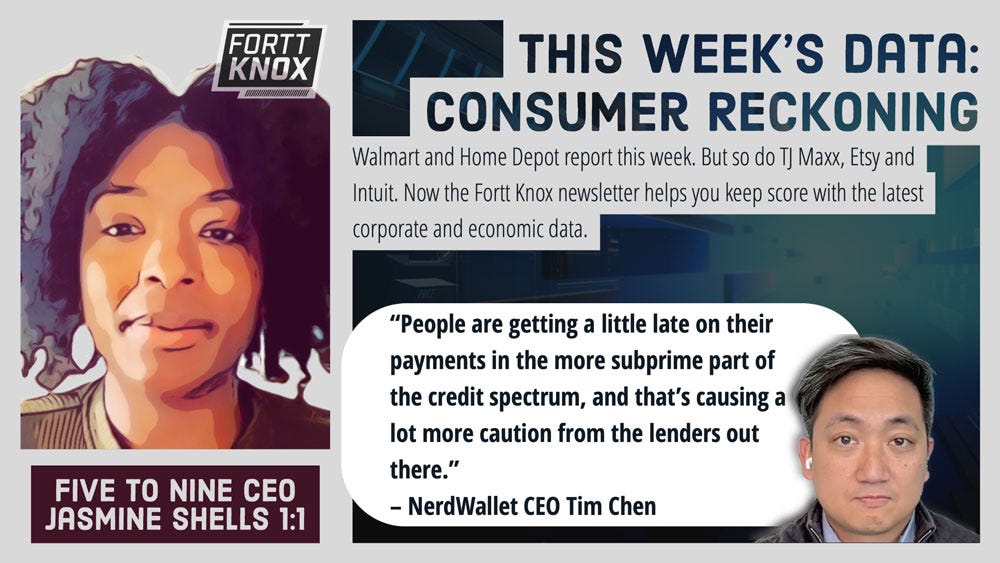Can Retail Save the Economy? Why This Week's Data Matters
Five to Nine's Jasmine Shells, NerdWallet's Tim Chen
It’s a big week in a couple of different ways: We’ll get earnings reports from some retail giants that will shed light on the state of the U.S. consumer and the overall economy; and I’m starting my first week on CNBC’s Closing Bell Overtime, which I’ll anchor alongside my friend and colleague Morgan Brennan.
I’ll still be as deep as ever in tech. But with the new role I’ll also pay closer attention to the earnings of every type of company, and to economic data and what it tells us about where things are going.
Because of that broader scope, you’ll notice a couple of changes in this Fortt Knox newsletter:
Most obviously, I’ve changed the lead image. It’s still about the people I’m talking to, but it’s also more about the data and insights coming through. Visual communication is a work in progress, and I’m sure I’ll continue to tweak it over time. Let me know what you think.
The content of this newsletter will change a little, too. Expect more financial data, and an explanation of why it matters to companies and to our everyday lives.
Speaking of which:
The economy is in a weird spot. After an awful year for the stock market in 2022, and a consumer who looked shaky to close out the year, the first two months of 2023 so far have offered a big bounce. In large part, that’s because investors became convinced that the Federal Reserve, which has been raising interest rates to slow down the economy, had pulled off a trick that once seemed impossible: Raising rates quickly enough to keep inflation from going nuts, but not so quickly that it tanked the economy and sent us spiraling into a recession. The Fed slowed from raising rates 75 basis points (.75 percentage points) at a time to 25 basis points. Stocks rallied.
But was the celebration premature?
The first big problem came in the form of the January jobs report, which showed the economy adding a stratospheric 517,000 jobs in January and the unemployment rate at an ultra-low 3.4%. For workers, those numbers are great. But for policy makers trying to cool an overheated economy? Not so much. Another problem came from the January CPI (consumer price index) report, which measures inflation. Prices rose .5% over the previous month, and 6.4% over the previous year. A worry now is that the reason the Fed hasn’t crashed the economy is because the economy isn’t slowing enough to begin with.
I have a related concern: Maybe the American consumer has gotten so used to cheap credit and plentiful jobs that we’re just not responding to higher interest rates the way we normally would. Credit card delinquencies are up and the savings rate is down, suggesting we’re spending money we don’t have.
Last week I heard from Five to Nine CEO Jasmine Shells, who is steering her software startup through tough times in the tech ecosystem. I also spoke with NerdWallet CEO Tim Chen about consumer credit habits, delinquencies, and how economic turbulence is affecting rich and poor consumers differently.
This week we’ll get more granular detail from Walmart and TJ Maxx about the spending habits of working class consumers. We’ll get data from Home Depot about the pace of spending on home renovations. And we’ll get important insight from Intuit on both consumer credit through its Credit Karma subsidiary, and on small business health through QuickBooks and MailChimp.
Tune in to CNBC at 4 p.m. ET, 1 p.m. PT to catch the news as it happens.





